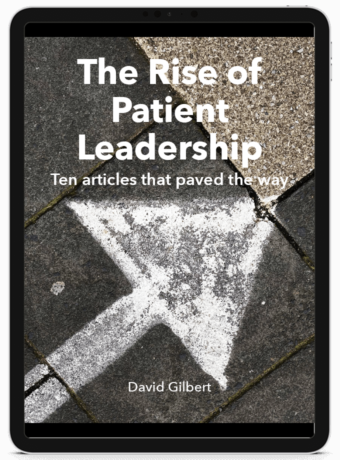Good Death, Bad Death: Notes for my mum and dad
Real Flowers
Five years ago, dad came out of hospital to die. Suffering from cancer, he went to stay at a hospice. The carpets were plush, the fixtures clean and tasteful paintings hung on the wall. Real flowers.
Visitors to his final bright room always commented on the beautiful bay window, replete with stained glass engravings of blue flowers. Commented so much in fact, that my father, recovering his sense of humour for a short while, said: “sod the bloody windows, you’ve come to see me”.
There was a cafeteria (not canteen) that opened up to a walled garden with paths leading to secluded spots by tall flowering plants where families could sit quietly and cry. We did a lot of that, surrounded by sparrows.
The staff seemed unhurried. There were no ‘cabbage’ smells, and little of the frantic rush that there had been on the 11th floor hospital cancer ward. Nurses and healthcare assistants asked more frequently about our needs and wishes, brought us tea and chocolate biscuits.
And, when we retired to the lounge (with small kitchenette for those ‘patients’ who were still able to microwave ready meals brought in by loved ones), there was a library of books and up to date newspapers and magazines. The radio was usually on Classic FM.
Dad had lived to 84, had played tennis up until his skin yellowed and we had got him into A&E fast. During the month’s swift decline, he had moved along his ‘palliative care pathway’ (god how we love our distancing terminology) relatively smoothly, until he ended up on the Liverpool one, much to the consternation of my step mother: “Why are they sending him to Liverpool?” she cried once.
We argued against him coming home as he did not want to turn his home into a hospital and be surrounded by machinery and sterilised equipment, nor could my step mum cope.
So, with communication and choice, pathways, plans and shared decision making, I found myself one evening by his bed. As he slept, pain softened by carefully dosed morphine, I bent over his bed, grasped his hand, whispered ‘I love you’ and ‘goodbye and ‘see you tomorrow’ and slipped out of the room and downstairs.
I put 50p in the vending machine and down dropped two KitKats for the price of one. That was when the fire alarm went off. It stopped after a minute. I checked in with one of the nurses who said that she would pop her head round his door every ten minutes.
I drove home slowly via the Heath where we had gone for family walks hundreds of times to feed the birds. I parked and strolled across a field in the dark. A fox dashed past me. That must have been about the time he died.
___
Plastic Flowers
Meanwhile, mum came out of hospital to die. Suffering from depression, neurological problems and deafness, she went back to her nursing home. The carpets were threadbare, the fixtures dirty and cheap oil reproductions hung on the wall. Plastic flowers.
Visitors to her musty room noticed how the wallpaper was peeling away. My mum had lost her sense of humour ten years previously. Her bed sores had got worse in the last few months, as the physio stopped coming and as her care plans were less frequently monitored: “help me” was her usual cry. Or: “don’t leave”. She was scared of the night staff.
The smell of piss and vomit hung just beneath the lavender air freshener. We brought our own biscuits. The TV blared out across the communal lounge and the ‘residents’ struggled to get the attention of the harried staff. Old Hello and OK magazines lay in scattered piles.
Mealtimes were an ordeal. We had to slowly spoon liquidised mush into her mouth. But this Viennese fine pastry cook refused any food in the end. Once or twice we managed to push her round the small lawn littered with dog ends in a squeaky British Red Cross rented wheelchair. We cried a lot, surrounded by sparrows.
Mum had lived to 81, had given up tennis long ago, and when her second husband died went into steady decline. Lonely and anxious, her mojo had given way. Maybe the past caught up with her (she was a Jewish refugee on the kindertransport), or perhaps the death knell had started to sound after seeing me struggle through my mental health problems (which she found impossibly hard to deal with) and after her second husband died. Whatever the reasons, she went downhill for ten long years.
Her ‘pathway’ was more like Hangar Lane Gyratory System in the rush hour; uncoordinated and lacking in compassion mostly. She had to be moved in regular succession from warden assisted housing, to assisted living centre to residential home and finally to a nursing home. She fell between numerous cracks in the health and social care system.
During all this, she broke her hip and was holed up in a godawful community hospital for weeks. That was the beginning of the real end. Later, after several hospital admissions (dehydration) where she lay immobile in a geriatric ward, surrounded by screaming patients, next to windows left open, she came back one final time to the nursing home.
So, with communication and choice, pathways, plans and shared decision making, all lacking, I found myself one evening by her bed.
That afternoon, I was told, she had exhausted herself by ripping at the wallpaper. When I arrived, she was asleep, small white strips curling down over her head. I watched her for a few hours, then bent over her bed, grasped her hand, and whispered ‘I love you’ and ‘goodbye’ and ‘see you tomorrow’. And slipped out of the room and downstairs.
I drove home down the main road, guiltily praying that she would soon be at peace. We got a phone call the next morning saying that she finally was.
___
Parity of Esteem?
Two deaths. Six miles and six months apart. The same country. The same family. Two deaths so different to one another. Why?
RIP John Gilbert
RIP Vera Rogers


Thank you David, you write so very well. It reminded me of Jack (Dr John) and Kathleen Devlin who died only 3 months apart, age 90 and 86, one in a hospital ward, one in a lovely hospice. I got a call at 5.30 in the morning from the ward sister to say come up as soon as you can; I was in Brighton, Dad in Camberwell; I made it for the last fifteen minutes of his life, with my mum holding his hand. Leaving the hospital after final quiet moments to tell him I loved him, and wish him well wherever he was going, if anywhere, I was welcomed by a wheel clamp. At his funeral, as we helped a very frail mum out of the limousine, I said goodbye to Patrick Uden, the family funeral director. We shared a wry smile, it didn't need to be said, hope we don't meet again too soon, knowing that the probabilities were stacked against that wish. After all the family and friends had consumed the sherry and the sandwiches, I sat on the old sofa next to my mum, and held her hand. My doctor eyes saw her finger tips, and the tell tale sign of clubbing, which almost always points to a terminal illness.
My mother and I were never close, we never really liked each other, too similar I think. In her hospice bed, surrounded by flowers, the blessed morphine pump, she found a peacefulness that had eluded her most of her life, and I had my chance to tell her that I loved her, and that I too had found some happiness, even though she disapproved of the path I had taken.
It was 11 years ago, I still think about them both most days. Thank you for reminding me about those last days.
The contrast in deaths is heartbreaking & unfortunately one I have heard too many times.
My mother's last two years of 'life' with terminal bowel cancer were punctuated with emergency admissions to hospital and lack of coordinated care which resulted in her suffering appaling levels of pain, sickness and personal indignities.
'There is no need for hospice care- which I asked for in her last month of life- 'We don't do that here..' was what I, and my father were told when she was discharged from hospital and sent home to die.
She couldn't walk, get out of bed or swallow more than sips of water, she was sick every 15 minutes, was in terrible pain and needed round the clock medical care but Dad and I were left to manage in a domestic bedroom. I had to battle to get the correct pain relief- she had also developed secondary bone cancer and couldn't bear to be touched or move- and battle to get the pump driver refitted( it had been taken off just before she left hospital) when she couldn't swallow any more. I had to battle to get nursing support as 'they'd just changed the system so it might take a while to get organised.' I had to battle to get prescriptions for morphine on time and to get them dispensed locally. I had to battle to get a doctor to call for additional pain and sickness relief for my mother....... I could go on.
She died 18 years ago and I have relived the experience every year since, traumatised by the memories, burnt on my brain and feeling that I failed her by not being able to get her the right care and support to enable her to have a good death.
My father died 10 years ago after having a massive stroke and he died in a hospital where staff talked to him, as he lay unconscious, treated him with care and dignity and demonstrated care and support for me and my brother too as we stayed at his bedside over the 3 days it took him to die. After his initial trauma- a relatively good death.
The difference- not the place as such - but having the right clinical and compassionate care that is responsive to a human's needs when it is needed most. In a supposedly civilised society and rich country with a National Health Service is that too much to expect for everyone?